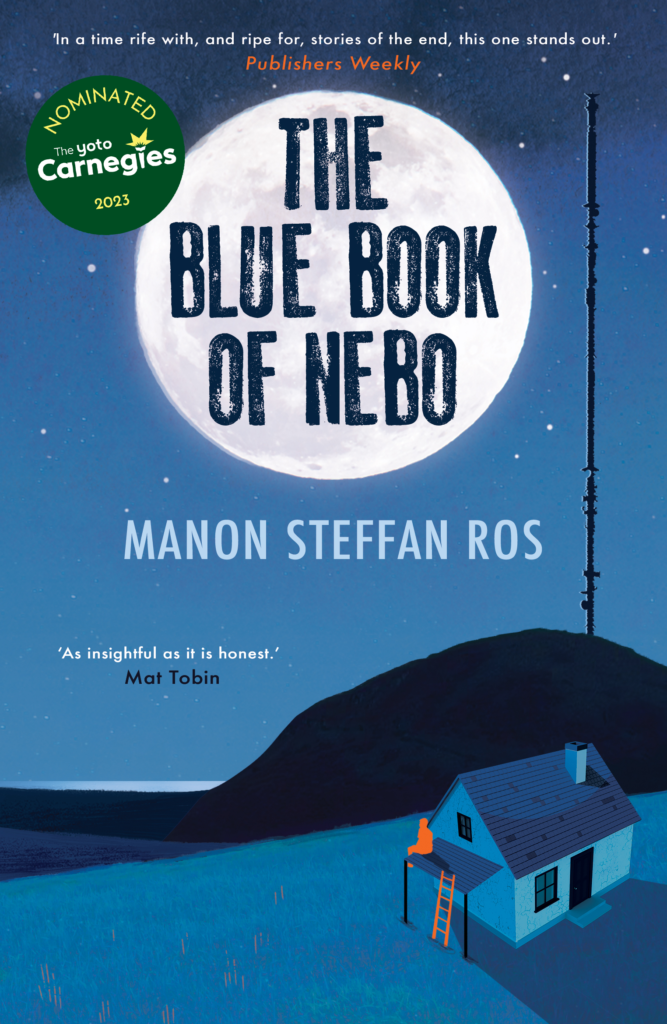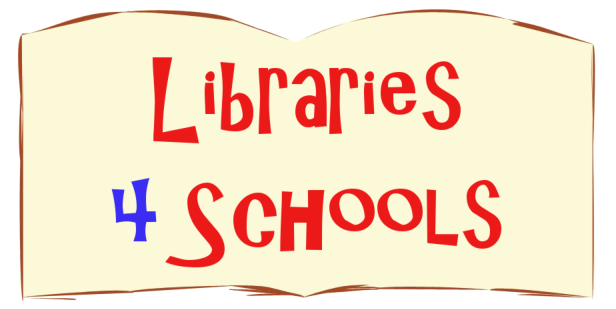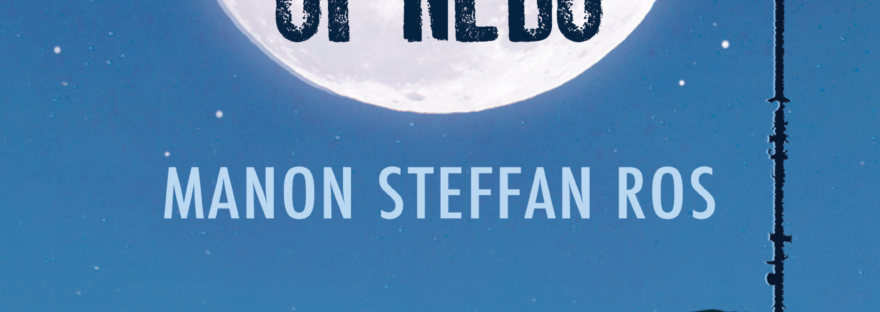By Manon Steffan Ros (published by Firefly Press, 2022)
‘The Blue Book of Nebo,’ I smiled, taking the book from her. The pages were blank and wide, like a new day.
‘Eh?’ asked Mam.
‘Like The Black Book of Carmarthen, or The Red Book of Hergest. That’s how they did it in the olden days.’ I’d read about them in a book of Welsh history. ‘Important books that said something about our history. And now is a part of history, isn’t it?’
It’s been eight years since The End; since the bombs fell, the electricity went out, and the people started to disappear. Dylan was only 6, and since then he and his mum Rowenna have relied on themselves, surviving in their hilltop house by scavenging in the nearby town of Nebo, collecting rainwater, and learning to grow their own food.
One day, while rummaging in a house in the village, Rowenna finds a blank notebook. She insists Dylan use it to write his story and about the present, and he insists that she use it to write about her history and the past. So together, they write the Blue Book of Nebo.

And that’s where we, the reader come in. The Blue Book of Nebo is written like both a diary and a record of events, alternating between Dylan and Rowenna; he covers most of the current events, and his feelings about them, while she mostly covers events from before The End, and how they ended up where they are now.
Given the nature of the book, it’s hard to describe the story itself. There is no obvious beginning, with us coming in years after the initial events took place, and although things happen they don’t feel like traditional ‘story beats’. Rather, we are invited to look into the lives of Dylan and Rowenna, to experience what they are going through and understand where they’ve come from.
Rowenna vacillates between positive and quietly sad, but also has a cold and cruel streak in her that she uses to shut down questions that she finds too difficult. She knows that she uses this against Dylan, and in any other setting this might feel abhorrent. When you learn what she has been through however, you find yourself empathising with her – she is still quite young herself, thrust into an impossible situation, but has to stay strong. It’s her way of protecting herself.
During the years since The End, Dylan has grown into a strong and capable teenager, learning a range of survival skills that make him seem older than his years. However, his youth is betrayed in his lack of understanding about certain things we take for granted – not just technology he can’t remember, but the nuances of human interaction that we learn from being around others, and his difficulty in grasping what Rowenna has been through.
Throughout the book, we meet a handful of other people, who each in turn shape our main characters’ lives. From Gaynor who ran the salon where Rowenna worked, to the lovely old couple next door, each is a complex character portrayed with sympathy. Considering the setting, none remain in the story throughout, and I found myself sharing Rowenna’s grief once they were each gone.
Ros does an excellent job of making the two main voices distinct from each other; sometimes when books have multiple point-of-view characters, they end up reading like the same person. Here, there is a strong contrast between Rowenna’s more worldly and adult approach to her writing, and Dylan’s well-read, but still naïve childishness.
The story is set in Wales, and despite the apocalypse and collapse of society, it never forgets its Welsh roots. Rowenna writes about her complicated feelings for the language, something Dylan cannot understand. The prose is peppered with references to Welsh stories and specific words that, as an English reader, I found enhanced the realism of the setting.
I think that the decision to set it in 2018 (when it was originally published in Welsh) was a smart one. It neatly avoids having to make up any “future” history, as happens when stories are set hundreds of years ahead, and also makes the setting relatable. The things that Rowenna writes about and remembers will be familiar to many readers, and it made me stop and think: where was I when this took place? What things would I miss in their situation?
The Blue Book of Nebo is a story about family and loss, as well as resilience and hope. It’s about what you can find and what is left when everything is taken from you. You won’t be given all the answers, and even the ending is left somewhat ambiguous with respect to how our characters feel.
It’s not a book to pick up if you want an easy read about relentless positivity in the face of adversity; I’m not sure a post-apocalypse story can ever be believable and easy at the same time. It is however a book to pick up if you want to feel human, with everything that entails – the tough decisions, the grief and fear, as well as the joy of sitting under the night sky, creating something from scratch, and building a life with the people you love.
Awards: the book was originally published in 2018 in Welsh as Llyfr Glas Nebo. In 2019, it won the Welsh language Book of the Year Award from Literature Wales, as well as the Aberystwyth University Fiction Award and the Golwg360 People’s Choice Prize in the same section. In 2018, it won the Prose Medal at the Cardiff National Eisteddfod.
As The Blue Book of Nebo, it won the Yoto Carnegie Medal for Writing 2023 (being the first book in translation to win), and is currently shortlisted for the UKLA Book Awards 2023 in the 11-14+ category.
If you want to experience the highs and lows of The Blue Book of Nebo, you can grab a copy at the link below.
(Disclosure: If you buy books linked to our site, we may earn a commission from Bookshop.org, whose fees support independent bookshops.)
Looking for more young adult books? If so, you can see our previous reviews here.

